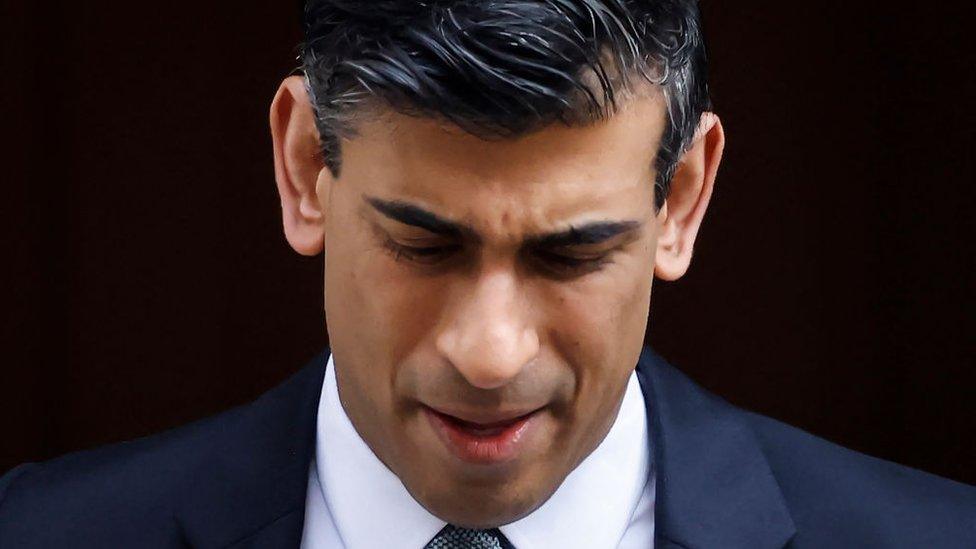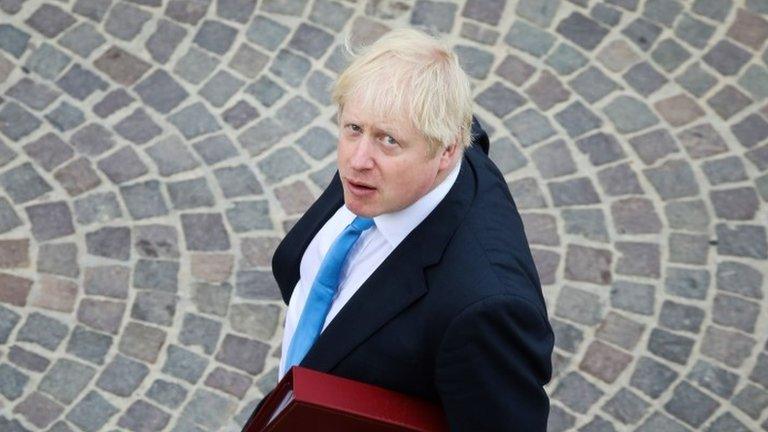Brexit: Corbyn plan to stop no-deal meets resistance
- Published
The prime minister "is taking us away from Europe into the arms of Donald Trump", says Jeremy Corbyn
Jeremy Corbyn's plan to prevent a no-deal Brexit by being installed as a caretaker PM has been met with opposition from key potential allies.
If he wins a no-confidence vote in the government, the Labour leader plans to delay Brexit, call a snap election and campaign for another referendum.
The SNP and Plaid Cymru did not rule out supporting a cross-party government to stop a no-deal exit.
But Lib Dem leader Jo Swinson said she would not support making Mr Corbyn PM.
Responding to Mr Corbyn's offer, she said Mr Corbyn's plan was not "viable" because he lacked the required support among opposition MPs in Parliament.
She offered to meet him in the coming days to discuss "who else might be able to lead an emergency government".
Earlier, she suggested Tory MP Ken Clarke or Labour's Harriet Harman - the longest serving male and female MPs in the House of Commons - could lead such a government, aiming to prevent a no deal on the 31 October deadline.
Tory Dame Caroline Spelman, whose backing the Labour leader had sought, also said she would not support a Corbyn-led government.
However, Conservative MP Guto Bebb said those opposed to a no-deal Brexit "must take seriously this type of offer".
"I certainly take the view that a short-term Jeremy Corbyn government is less damaging than the generational damage that would be caused by a no-deal Brexit," he said.
Prime Minister Boris Johnson said he wants a deal with the European Union, but insists the UK must leave the bloc by the end of October "do or die".
Mr Corbyn asked opposition figures and Tory rebels for their support in a letter on Wednesday, pledging that a government led by him would be "strictly time-limited".
He said he would call a no-confidence vote - which would require majority support - at the "earliest opportunity when we can be confident of success".
If he were to succeed in calling a general election - which would require the support of two-thirds of MPs - Labour would campaign for a second referendum with the option to remain in the EU, he said.
Swinson: MPs 'should stand and be counted'
Ms Swinson's rejection of a Corbyn-led emergency government was criticised by Scottish First Minister Nicola Sturgeon.
"Jeremy Corbyn's suggestion is not the only possible option - but given the circumstances, nothing should be ruled out at this stage," she tweeted, external.
"Jo Swinson should rethink," she added.
'Political point-scoring'
Shadow education secretary Angela Rayner also criticised Ms Swinson, accusing her of "political point-scoring".
"Our leader is Jeremy Corbyn and she should respect his title as the official opposition," she tweeted, external.
But Conservative anti-Brexit campaigner Dominic Grieve said a national unity government led by Mr Corbyn was a "most unlikely way forward".
He told BBC Radio 4's PM programme that a caretaker prime minister "has got to be somebody who can inspire trust".
"Seeing Jeremy Corbyn's history, it's difficult to see how he could possibly be in a position to do such a thing."


At the moment the numbers don't look great for Jeremy Corbyn.
There's a significant proportion of MPs who would be prepared to stop no deal, but at the moment they're not quite coalescing around Mr Corbyn's plan.
The Liberal Democrats are reluctant to get on board, while some Conservative MPs are highly sceptical about the idea of putting Jeremy Corbyn in No 10, even as part of a temporary arrangement.
However, there are some who are open to this idea including the SNP and Plaid Cymru.
Four Conservatives have said they are prepared to meet Mr Corbyn to discuss stopping a no-deal Brexit, but have not explicitly supported Mr Corbyn's plan.
For those who hold the view that no deal would be a disaster for the country, the danger is they may fail to agree a plan.

What is a vote of no confidence?
If the government loses a no-confidence motion, it would trigger a critical 14-day period, after which a general election could be triggered.
If Mr Johnson failed to win such a vote, then a general election would be called.
There are no firm rules about who else - if anyone - should get the chance to form an alternative government during this time.
The leader of the opposition is clearly a likely candidate, but that is not an inevitable outcome.
The Cabinet Manual - a document which sets out the main rules covering the workings of government - suggests that the principles applied should be similar to those after an election in which no one party wins a majority.
That means that the old prime minister should only resign if and when it is clear that somebody is more likely to have the support of MPs.
So, it is possible that the existing prime minister would stay in place, or that more than one leader would get a chance.
Mr Johnson has a working majority of just one in the House of Commons, with the backing of Northern Ireland's Democratic Unionist Party.

- Published7 December 2023

- Published3 September 2019
